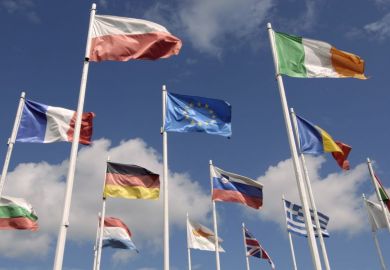With two months to go until the anticipated start of Horizon Europe, a crucial issue is still open: exactly how and on what terms will non-member states be able to participate?
Currently, the European Union is working hard to agree a position in the “trilogues” between the European Council, the European Parliament and the European Commission about the conditions under which these “third countries” could associate to the EU’s next seven-year research funding framework. The EU’s view about association, and how successfully it negotiates with third countries, will fundamentally affect the nature of Horizon Europe.
A first issue is the timing. Because the EU has not finalised its own position, it has not started negotiations with Switzerland and other interested countries (although a date with Israel has been set for early December). Researchers in these countries can still prepare funding applications, which can be considered once Horizon Europe has started on the assumption that their country will associate. But this does not resolve the uncertainty facing researchers from third countries.
A further concern relates to the level of payment for association. Under Horizon 2020, countries pay a set contribution in relation to their GDP. As Horizon is an excellence-based programme, some countries gain more than they pay, others are net contributors. But Horizon Europe has ambitions to be opened up to the world, which calls into question the viability of that approach.
The draft regulation proposes that countries that are strong in research and innovation (R&I) could associate to some or all parts of Horizon Europe as long as those nations share the EU’s democratic values. As a result, it would be possible for countries such as South Korea, Singapore or Canada to participate. But could these countries really agree to pay a proportion of their GDP when they (and the EU) have no idea about how much their researchers would receive from the programme?
This question has exercised the UK greatly. Up until the early years of Horizon Europe (before the Brexit vote), UK-based researchers won around 15 per cent of all EU research funding – a figure that is not far off the UK’s GDP in relation to the EU’s (depending on the source, between 16 and 18 per cent in 2019). But since 2016, the UK has only won around 12 per cent of funding. If the decline held, or even continued, the UK could lose billions of pounds over a seven-year period. If the decline were reversed, the UK could be in balance.
To remedy this uncertainty, the EU’s March 2020 proposal for a “new partnership” with the UK proposed a correction mechanism – but only in the EU’s favour. There was no suggestion that the UK would receive money back if it overpaid. But for the UK – as for any other new entrant – the principle of a one-way correction mechanism in the EU’s favour seems extremely difficult to defend.
Crucially, it appears that compromise is being discussed. This could take the form of an exit clause for the UK if the deficit exceeded an agreed amount, or a correction mechanism to work in both directions after participation rates have stabilised (say, after two or three years). This would set an important precedent for all other third-country association discussions.
A final key issue – often overlooked – is how the contributions from associating countries will be spent within Horizon Europe. In Horizon 2020, the money is distributed evenly across the different instruments within the framework programme, with the European Commission having a significant amount of discretion; it may, for instance, reserve some funds for arising R&I priorities, such as fighting the Covid pandemic.
If this system were maintained, it would have serious implications for Horizon Europe. Imagine that the UK attracted a disproportionate share of its funding from the European Research Council (ERC) – as it currently does in Horizon 2020. If this disproportionate allocation of ERC funds were not reflected in the money the ERC received back from the UK, it would reduce the ERC funding available to other researchers. That shortfall could be reinforced by the association of other countries that might be expected to perform strongly, such as Switzerland and Israel, as well as possible new entrants such as Australia or Canada.
If third-country association eroded the amount of ERC funds available to EU member states – translating into declining success rates for their scientists – it could quickly drain away support for third-country association among EU researchers. That is why the European Council concluded last month that associated countries’ payments should be reallocated with regard to their success in the different components of Horizon Europe. The ERC must not be the victim of its own success; it should not lose out financially if strong R&I systems from outside the European Economic Area are drawn to put in many strong applications for its prestigious funding.
In short, third-country association to Horizon Europe will have to look very different from third-country association to previous framework programmes. Third countries should strengthen the instruments to which they contribute. They should contribute in a way that is fair for both sides (including on the administrative cost). And association agreements need to be in place quickly to minimise disruption for long-time partners.
The EU’s success in bringing on board Switzerland, the UK and other third countries in a timely way will be pivotal to Horizon Europe’s depth and breadth.
Jan Palmowski is secretary general of the Guild of European Research-Intensive Universities and professor of modern history at the University of Warwick.
POSTSCRIPT:
Print headline: Horizon Europe’s terms must be fair for all
Register to continue
Why register?
- Registration is free and only takes a moment
- Once registered, you can read 3 articles a month
- Sign up for our newsletter
Subscribe
Or subscribe for unlimited access to:
- Unlimited access to news, views, insights & reviews
- Digital editions
- Digital access to THE’s university and college rankings analysis
Already registered or a current subscriber?







